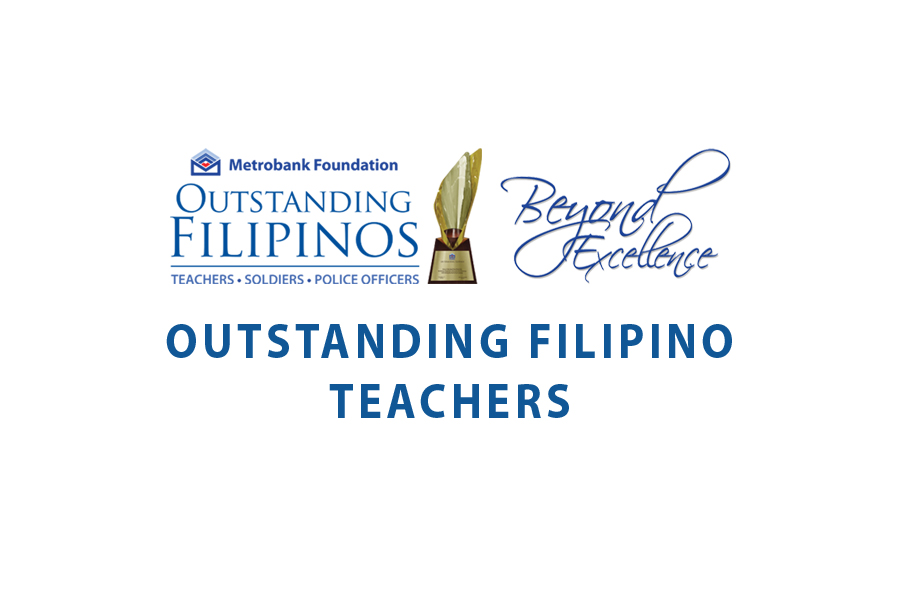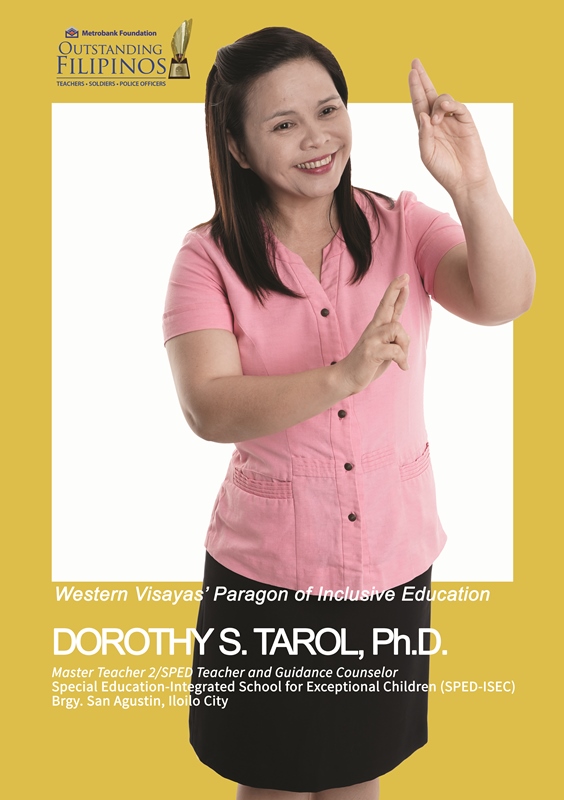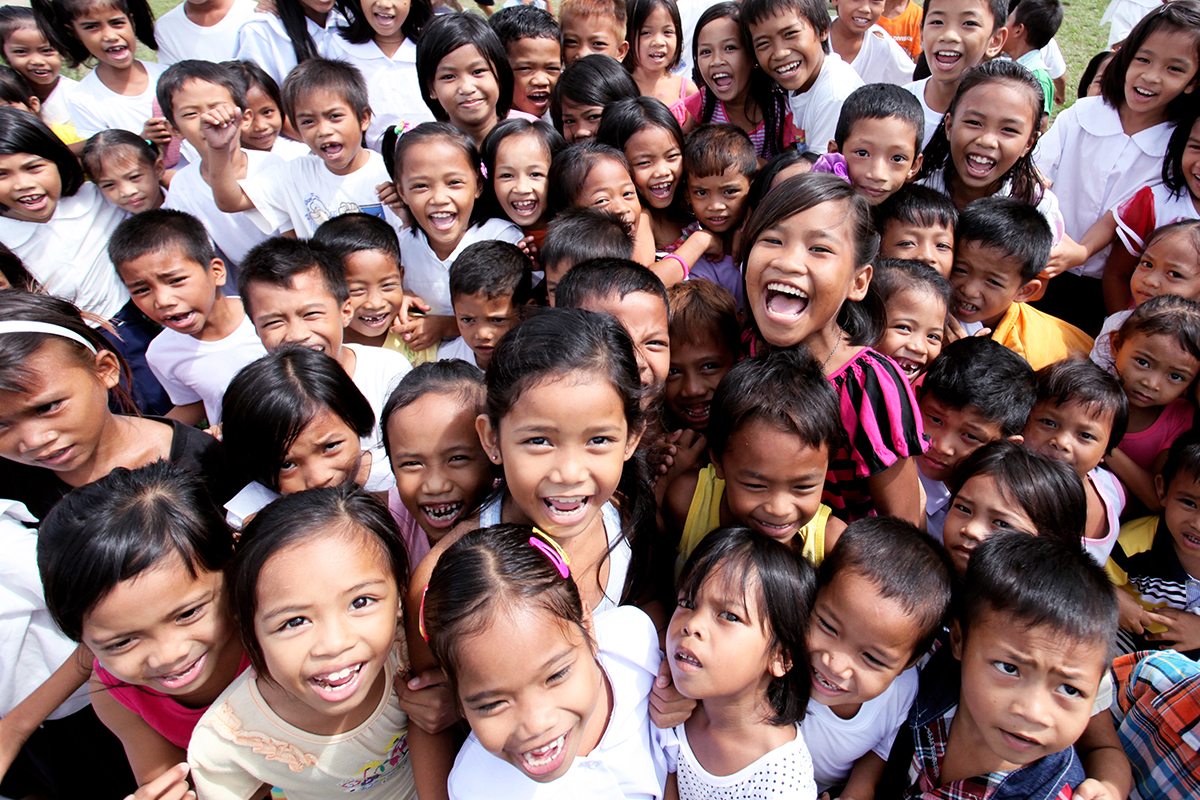
Profiles of the 2019 MBFI Outstanding Filipino Teachers

“It is a privilege to be a teacher of diverse population and a mentor who shares research as synergistic activities to her colleagues; a researcher who contributes to the generation of new knowledge; and a public servant who uses reading as a weapon.”
Perhaps there is no greater quality strongly linked to the Filipino identity than resilience. It is no surprise then that this is the trait that best characterizes Dr. Dorothy S. Tarol’s story as a teacher and a mother. Having a “principle-based resilience,” says Dr. Tarol, kept her driven amidst personal ordeals. Most importantly, it pushed her to empower diverse, marginalized communities whose resilience, like hers, do not easily falter.
Dr. Tarol aspires for instruction without barriers. Her solid stance on inclusive education comes from a personal source. Progressively losing her hearing at 35, Dr. Tarol has shifted her teaching career to cater to students with disabilities at the Special Education-Integrated School for Exceptional Children (SPED-ISEC) in Iloilo City.
Dr. Tarol has since devoted her life’s work onto shaping an environment conducive for learners of all kinds. She is best recognized for writing and implementing in 2011 an action research entitled “Buddy-Mediated Instruction (BMI): Pivotal Strategy for Spelling and Social Skills for Students with Hearing Impairment” which aims to develop a student’s basic literacy skills.
BMI addresses the top two learning gaps of persons with hearing impairment: spelling and social engagement. Since language skills are auditory-based or learned through constant hearing, those with any degree of hearing loss have difficulty in absorbing its dynamics.
In a nutshell, the program pairs two students—a quick learner and another who learns at a slower pace—who study together through peer counseling. Deviating from a “tutor-tutee” relationship, the term “buddy” is used so as to not discriminate against their fast-slow difference. Buddies engage with each other through learner-initiated activities such as recreations, bonds and conversations supported by flip charts with illustrations and finger spellings or letters and numbers represented by hand signs.
Dr. Tarol, originally adapting a foreign strategy, also promotes mother tongue-based teaching in BMI.
BMI became the inspiration for the production of a workbook called “Pinanid nga Hilikuton sa mga Kasampaton sa Hiligaynon” (Workbook in Hiligaynon for Kindergarten), a mother tongue-based book which provides exercises in reading, writing, counting, and finger spelling to kindergarten students with hearing impairment. To date, the Department of Education’s (DepEd) Learning Resources Management and Development Portal, a digital library of downloadable teaching and learning materials, registered around 900 downloads of the workbook. BMI, as an instructional strategy, also became a benchmark model in the DepEd Divisions of Iloilo and Iloilo City and was already replicated by around 178 schools.
For Dr. Tarol, a teacher’s work does not stop when she steps out of the classroom. Beyond the school premises, she introduced her instructional approach to indigenous learners and Persons Deprived of Liberty (PDL) through an offshoot of BMI called “Ang Pagbasa ay may Pag-asa Program.”
This extension initiative ensures that Dr. Tarol’s contextualized and localized learning materials also benefit multi-grade Ati Tribe Learners in Andres Drapiza Extension, Camangahan Elementary School, Guimbal, Iloilo and non-literate PDLs in the Bureau of Jail Management and Penology in Ungka Jaro, Iloilo CIty.
During weekends, Dr. Tarol, accompanied by her family, travel by at most two hours to reach the indigent schools. Apart from conducting lessons using her trademark materials, she also distributes food, hygiene kits and learning supplies to her students.
Dr. Tarol also advocates for equal career opportunities for persons with disabilities. In 2007, an organization registered as the Association of Late-deafened, Deaf, Hard-of-Hearing, for Education, Advocacy, Research and Support (ALDHEARS) was co-founded by Dr. Tarol. ALDHEARS currently serves 40 active members and non-members aged 25 to 39, majority of which are also alumni of SPED-ISEC.
In the hopes of raising awareness on issues faced by people with disabilities in the workplace that include discrimination and prejudice, Dr. Tarol, through ALDHEARS, actively lobbied among employers equal opportunities for their members. To date, 36 have permanent jobs and are still monitored and counseled by her.
With all these advocacies in-action and for her exemplary service, Dr. Tarol received several recognitions throughout her profession including the “Pambansang Ulirang Guro” title in 2018, the Learners for Educators Excellence Award in 2017 and Harvest of Excellence Awards, also in 2017.
Dr. Tarol, 50, holds a Master Teacher II position at SPED-ISEC since 2015, and is a registered guidance counselor. She earned her Doctorate degree in Educational Management at the University of San Agustin, Iloilo City and two master’s degrees in Guidance Counseling and Special Education at the University of the Philippines Visayas and West Visayas State University, Iloilo City, respectively.
Dr. Tarol is married and a mother of four.

“I would like to be remembered as the students’ Philippine history teacher who had opened their eyes about our country’s history; a teacher who made them love and enjoy history. History should not be seen as a collection of facts to memorize, but a subject that connects present issues with past events. My goal is for students to understand better our society, to make them more aware and involved with the pressing issues and problems of today—trademarks of good and participative citizenship.”
For Dr. Cristina B. Cristobal, history unfolds quite differently to those who only commit information to memory than those who learn it by heart. This belief served as her drive to inspire changes, at the very least, to Philippine Science High School (PSHS) students’ perspective towards learning history. And true enough, PSHS System’s Social Science curriculum saw a series of transformations leading to its present, progressive status.
Dr. Cristobal thus introduced a teaching strategy that requires Grade 7 learners to use primary sources in studying history. She believes that exposing students to primary sources provides an evidence-based approach to learning. This develops students’ skills in history and deepens their understanding of past events.
An offshoot from her Doctor of Philosophy dissertation which focuses on the historical thinking skills of high school students in select schools, the approach provides opportunities for students to analyze documents, review data and construct historical narratives firsthand—a deviation from the traditional learning through textbooks and memorization.
Students, therefore, engage in the construction of knowledge—making the learning of history more meaningful. The use of textbooks has become secondary, being supplemented by study of documents, records, pictures of artifacts and the like. In one student project for example, students chronicle family, institutional or local narratives juxtaposed with the country’s national or local history. Students must personally interview sources or look into personal journals, manuscripts and audio recordings for their requirements. Over time, stories of families whose ancestors experienced the war, among others, were discovered, documented and archived. For Dr. Cristobal, this activity connects students with the past; hence history for them becomes alive and relevant.
Given the good reviews she has received from her students and colleagues, Dr. Cristobal proposed this pedagogical approach during PSHS-System’s curriculum review in 2004 and 2011, resulting to its integration in all regional campuses’ curriculum guide in teaching Social Science I.
In more recent affairs, Dr. Cristobal has successfully pushed to retain teaching Philippine History to Grade 7 PSHS students—considering that this subject was dropped by the Department of Education in high school due to the K-12 program.
As a Social Science teacher for four decades now, sustaining the course in high school is important to reinforce and deepen students’ knowledge and understanding of Philippine History from what they have learned in elementary. It also resonates with the idea that the teaching and learning of Philippine History plays a very significant role in developing love for country and service to our people.
Accordingly, Dr. Cristobal also propounded the inclusion of teaching Philippine Government, Philippine Politics and the 1987 Constitution in the PSHS System’s Social Science curriculum for Grade 10 students.
Outside the classroom, Dr. Cristobal actively spearheads teacher-training courses that introduce best teaching practices of PSHS.
Dubbed as “Pisay Teach,” Dr. Cristobal’s first program is anchored on the belief that graduating education majors need to be inspired to really pursue teaching as a career and vocation, and to present to them how quality education can be done. PSHS-Main Campus’ (MC) seasoned teachers are pooled to conduct lectures on various teaching strategies, classroom management, trends in subject content, and micro-teaching.
Pisay Teach, which ran from 2010 to 2015, now takes a different form as a teacher-training program focusing on Islamic teachers across Mindanao called “Buklod Guro.” The program branched from Ateneo de Davao University and PSHS-MC’s “Madaris Volunteer Program” where volunteer teachers are sent to privately managed madaris or Islamic schools to provide training for teachers and administrators. Dr. Cristobal heads the organization of the trainings which consist of three parts: teaching strategies, mentoring, and demo teaching. Since 2017, Buklod Guro succeeded in providing training programs to madrasa educators based in Davao, Cotabato, Maguindanao, Zamboanga del Sur, Basilan, Tawi-Tawi and Sulu.
Other than these activities, Dr. Cristobal, as a former adviser of the school’s Student Council, had engaged in outreach work—initiating assistance efforts to survivors of natural and man-made calamities in various provinces like typhoons Ondoy, Sendong, Yolanda, Bohol earthquake, and Zamboanga City siege.
Dr. Cristobals’ efforts yielded her recognitions from the institution where she has focused most of her life’s work. This includes the Natatanging Guro Award in 2010 and Dangal ng Bayan Award in the Main Campus resulting in her nomination to the Dangal ng Bayan National Award by the PSHS System in 2017.
Dr. Cristobal, 61, is currently a Special Science Teacher 5 at the country’s premier state science high school. She wore her Sablay thrice as a graduate of the University of the Philippines Diliman where she earned her Ph.D., Master’s and Bachelor’s degrees in Social Science Education.
She is married to a social science teacher, a mother to four and a grandmother to two.

“I have learned that there is so much we can be proud of—but are either we are unaware or oblivious to. Awareness of this past would build a sense of pride and hopefully, unity.”
For acclaimed historian like Dr. Ricardo T. Jose, he remains to be a student on his own accord—a scholar whose passion for history has not waned, and who keeps on learning as there is much to discover, still.
Dr. Jose has spent 40 years filling the gaps in the country’s past, more profoundly on the subjects of Philippine diplomatic history, Philippine military history, the Philippines under United States of America’s (USA) colonial rule, and the tie between the Philippines and Japan. But his trademark expertise, to which he is most cited for, is on World War II.
Tagged as the country’s foremost scholar on World War II in the Philippines and the Asia-Pacific, Dr. Jose has been involved in producing majority of materials on this topic, whether as a direct collaborator or as a key resource person. His vast expertise is undeniably a result of his tireless efforts to study in different libraries and sift through a number of archives across the Philippines, Japan, and the USA, as well as to personally interview war veterans of diverse nationalities.
As a result, Dr. Jose has produced a body of work that serves as the foundational literature on the study of the Second World War. Two of which he considers seminal works: “The Philippine Army” and “The Philippines Under Japan,” the first Japanese scholarly research on the Japanese occupation of the Philippines made available in book form. For the latter, Dr. Jose was the only Filipino in the team.
The breadth and depth of Dr. Jose’s works indeed serve not only as his legacies in his own institution but preserving the memory and shedding light on the country’s historical narrative.
Sharing to his students his extensive portfolio proves to be the most rewarding for him. Upon earning his bachelor’s degree in 1978, he was immediately invited to join the UP Diliman History Department under the College of Social Sciences and Philosophy. Since then, Dr. Jose has seen himself as a “conduit” in making the past alive again in the present for his students and fellow scholars.
To many of Dr. Jose’s generations of students, he is often remembered as someone who would bring historical artifacts such as helmets, air raid sirens, and yellowing photographs during class discussions. These artifacts are part of his rich and distinct private collection, acquired throughout his years of research.
Yet unlike other collections, his do not stay inside glass boxes as a display, but are brought inside the class and shared with his students—bringing history in the palms of their hands. Beyond his exhibits, his mastery of the subject combined with the lighthearted delivery of lectures often leaves his class in awe.
Relative to this, Dr. Jose also channels his energies into strengthening the history courses offered in the university. He restructured several undergraduate and graduate courses in UP Diliman’s History Department which includes the “Japanese Occupation of the Philippines” (Kasaysayan 230), “History of the Commonwealth of the Philippines” (Kasaysayan 205), “Diplomatic History of the Philippines” (Kasaysayan 115) and “Special Topics on Philippine Military History” (Kasaysayan 128). Since 1996, he is the only faculty member who teaches these courses.
Further, his stature in the academe reinforced his reputation as a sought-after resource person by historical documentaries and television programs produced in the local and international scenes such as BBC, NHK, and the National Geographic.
He delivers lectures and conference papers in leading universities in the Asia-Pacific, Europe, and the USA. He also shares his expertise in military and diplomatic history to several government institutions such as the Foreign Service Institute, National Defense College of the Philippines and the Armed Forces of the Philippines.
During his free time, he helps put up exhibits or vestiges of the war in far off localities. An example of which is his involvement as a historical consultant and speaker in the long-running multi-awarded travelling exhibition, called “War of our Fathers: A Tribute to the Filipino Freedom Fighters,” organized and funded by the Philippine Veterans Bank.
Recognitions for his dedication as a historian and scholar were not short in coming. In 1997, Dr. Jose was the first and one of the only two recipients of the Outstanding Young Scientist Award in the field of History from the National Academy of Science and Technology. He also scored a rare feat in winning the UP Diliman’s Gawad Tsanselor thrice and in different categories: in 1998 as an outstanding researcher and in 2011 and 2018 as an outstanding teacher.
But with all these, he said the “Natatanging Guro” award given by the UP Diliman College of Social Sciences and Philosophy Student Council twice, is his most prized. For him, the measure of a mentor rests in the high regard given by his students.
Dr. Jose, 61, currently a Professor 12, previously chaired the Department of History and the Third World Studies Center, also in UP Diliman. He majored in history both for his bachelor’s and master’s degrees in UP Diliman. In 1995, he became the first graduate of the Tokyo University of Foreign Studies’ Ph.D. program in history/ area studies.

“Genetics is not a well-known subspecialty in medicine. A dire need for more geneticists in the country has to be addressed. I have chosen to embrace this challenge. Being in the teaching profession has given me an excellent opportunity to teach this new emerging subspecialty of clinical genetics and genomic medicine in the Philippines that seeks to answer the special needs of patients and families not met by any other existing specialties of medicine.”
Being outstanding seems to run in university professor and physician Dr. Eva Maria C. Cutiongco-de la Paz’ genes whose mother, Dr. Elena C. Cutiongco, was also conferred the Metrobank Foundation Outstanding Teacher title back in 1985. Her mother specializes in English instruction while Dr. Cutiongco-de la Paz has dedicated her 22 years in the teaching profession to genomics, a branch of biology concerned with the study of genes.
For Dr. Cutiongco-de la Paz, teaching genomics has given her an opportunity to dig deeply into this emerging subspecialty of clinical genetics and genome medicine in the Philippines. It is the discipline that seeks to answer the needs of patients and families not met by any other existing specialties of medicine.
Recognizing the dire need for more geneticists in the country, she, along with her colleague Dr. Carmencita Padilla, established a Clinical Genetics Fellowship Program, the first and only one of its kind teaching and training program in the subspecialty of Genetics in the country. The program aims to teach and train young physicians in the evaluation, diagnosis, management, and counseling of patients with common genetic conditions, as well as the rare ones.
Dr. Cutiongco-de la Paz, as the first training officer, was able to lay the groundwork in equipping Filipino clinicians and researchers about the role of genetics in health and disease. Back in 1998, she was only one of two geneticists serving the needs of 75 million Filipinos. Today, the program has trained Clinical Geneticists who have stayed in the academe such as the University of the Philippines (UP) and other universities, while others moved back to their home provinces to be instruments in improving the access of clinical genetic services throughout the country. There are now 16 geneticists serving 106 million Filipinos.
She has successfully led a special research project under the Commission on Higher Education – Philippine California Advanced Research Institutes (CHED-PCARI) that aims to enhance instruction, and teaching and training innovations in genomics research. The newly inaugurated CHED-PCARI Shared Genomics Core Laboratory at the Philippine Genome Center in UP Diliman, where she serves as Director for the Health Program, houses state-of-the-art genomic sequencing equipment that can significantly accelerate and expand discoveries run by Filipinos for their fellow Filipinos.
It is a valuable resource for higher educational institutions in their pursuit of higher learning and discovery, especially in the emerging fields of genomics to advance genomic medicine, to harness genomic information for food security and to better understand the genetic make-up of Filipinos. Having the laboratory provides a competitive advantage for the country to achieve a leading position in the Asia Pacific region for innovative genomic research.
As for Dr. Cutiongco-de la Paz’s extension work, she makes sure all her efforts in advancing genomic medicine and research in the country reach the underserved population. Apart from taking care of patients with birth defects and other genetic conditions, she is currently part of an international team of experts with an extraordinary mission to advance the understanding and ability to treat X-Linked Dystonia Parkinsonism or XDP.
XDP is a brain condition causing involuntary movements of the body (dystonia) combined with parkinsonism, primarily afflicting some Filipino males born to mothers who come from the Panay Group of Islands. Dr. Cutiongco-de la Paz’s advocacy is to provide genetic education, testing, and counseling. She teaches patients and their family members about the genetic basis of XDP, counseling them on how it is being passed from one generation to another, and finding support mechanisms for them to cope up better. At present, genetic education and counseling have been integrated in the clinical care of patients and families with XDP.
Given Dr. Cutiongco-de la Paz’s extensive work as a professor, physician, researcher, and community educator and advocate, she has earned laureates throughout her entire career. The list for her professional recognitions given by UP, to name a few, includes the Gawad Sentenaryo Professional Chair Award for Teaching and Research in Pediatrics and Genetics (2011), Gawad Tsanselor-Outstanding Researcher Award (2011) and the UP Alumni Association Distinguished Alumni Award for Health Research in Genomics to Advocacy (2017). The civilian awards she received, on the other hand, include the Dangal ng Bayan, Outstanding Public Officials and Employees Award (2018), Dr. Jose Rizal Memorial Award (2012), The Outstanding Women in the Nation’s Service (2007) and The Outstanding Young Men for Genetic Medicine (2002).
Dr. Cutiongco-de la Paz, 56, a Professor 10 of the College of Medicine and Executive Director of the National Institutes of Health both in UP Manila, finished her BS Biology degree cum laude at UP Diliman, earned her medical degree at the UP College of Medicine and pursued residency training in Pediatrics at the Philippine General Hospital. She completed a fellowship in Molecular Genetics at the Kobe University Graduate School of Medicine in Japan and a fellowship in Clinical Genetics at The Hospital for Sick Children, University of Toronto, Canada.
Dr. Cutiongco-de la Paz is married to an ophthalmologist and a mother of two.





